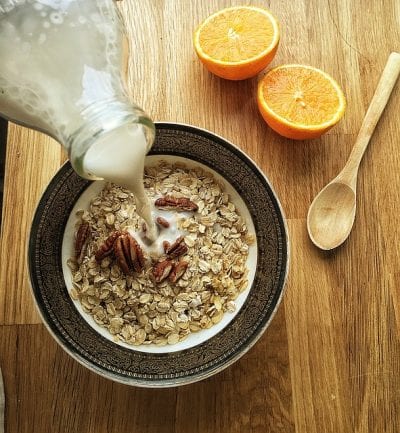
Currently, almond milk it is one of the most popular vegetable milks thanks to its almond flavor and creamy texture.
Next we made a review of the most important aspects of almond milk: properties, contraindications, caloric content ...
What is
Like soy or oatmeal, almond milk is a milk of non-animal origin. It has a pleasant almond flavor and is a good option for vegetarians, vegans, people with lactose intolerance and, in general, for anyone who needs to cut back on dairy. Its uses are the same as those of normal milk: coffee, cereals, smoothies, baked goods ...
Properties
In its pure versions (without additives), almond milk it is low in calories and rich in healthy fats. It also stands out for its natural richness in many vitamins and minerals, especially vitamin E. In addition, it does not contain saturated fat, soy, lactose or cholesterol.
Almond milk benefits
When it does not contain added sugars or artificial ingredients, the milk in question on this occasion helps control blood sugar. This makes it suitable for diabetics.
Research shows that can lower LDL cholesterol, inflammation and improve brain function. It also increases the beauty of the skin, promotes heart health and helps prolong the feeling of fullness.

Are you fattening?
It all depends on the version. There are almond milks that contain 30-40 calories per cup. That means a saving of more than half the calories compared to skimmed cow's milk. However, the sugary versions can have their calories multiplied by two or even more.
Almond milk and thyroid
There are mixed opinions regarding the effects of almonds on the thyroid gland. Some experts warn that it can affect the assimilation of iodine in this gland and thus lead to an enlargement of it, while others consider almond milk as a booster of immune power.
It is best check with your doctor before making any major changes to your diet, how to change the type of milk.

Contraindications
All the people with a nut allergy they may have an allergic skin response. Almond milk can also cause an outbreak in people with Crohn's disease. If this is your case, consider consulting with your doctor before including it in your diet.
If you have a tendency to acne, keep in mind that, when it includes additives such as sugar and vegetable oils, almond milk can lead to breakouts or worsen existing acne conditions.
Are ingredients with hard-to-pronounce names on the label? Not all are harmful to health, but use caution when it comes to artificial ingredients. Especially if you are following a diet free of processed foods on medical advice.
Substitute cow's milk for almond milk can cause a reduction in calcium and vitamin D levels. To prevent this, look for versions fortified with these two nutrients. If you drink homemade almond milk, make sure your diet includes good sources of calcium.
Despite not containing lactose, almond milk can cause symptoms similar to lactose intolerance in some people. This may be due to a placebo effect or because the body takes time to adjust to its proteins.
Recipe
- To make homemade almond milk, you have to soak the almonds for at least eight hours.
- Then they are added to an American glass along with five cups of mineral water for each cup of almonds. Increase or decrease the amount of water depending on whether you like it thicker or more liquid.
- Blend for 1-2 minutes until you get a smooth and creamy drink. To finish, strain it and consume it at the moment. It can also be kept for a few days in the refrigerator. In this case, shake it well before serving.
- Vanilla extract and salt are among the many optional ingredients you can add to your homemade almond milk, although the purer we keep it, the healthier it will be.

Nutritional value
A serving of almond milk provides one gram of fiber, three grams of fat and the 50 percent of the recommended daily dose of vitamin E. In the case of thiamine, riboflavin and magnesium, the percentages reach 11, 7 and 5 percent, respectively.
Its calcium intake is negligible. It should be noted that fortified versions can reach 300 mg of calcium, equaling skim milk. However, there are numerous studies that indicate that taking calcium supplements is not advisable.
The biggest problem with almond milk is that it is low in protein (1.5 g) and many other nutrients, when compared to cow's milk and other vegetable milks. That makes it the least good choice for daily consumption.
Where to buy almond milk
Currently, most supermarkets offer almond milk. So this is a product that is not difficult to find. However, they tend to have numerous additives. To get pure almond milk you need to go to natural stores or prepare it yourself at home.